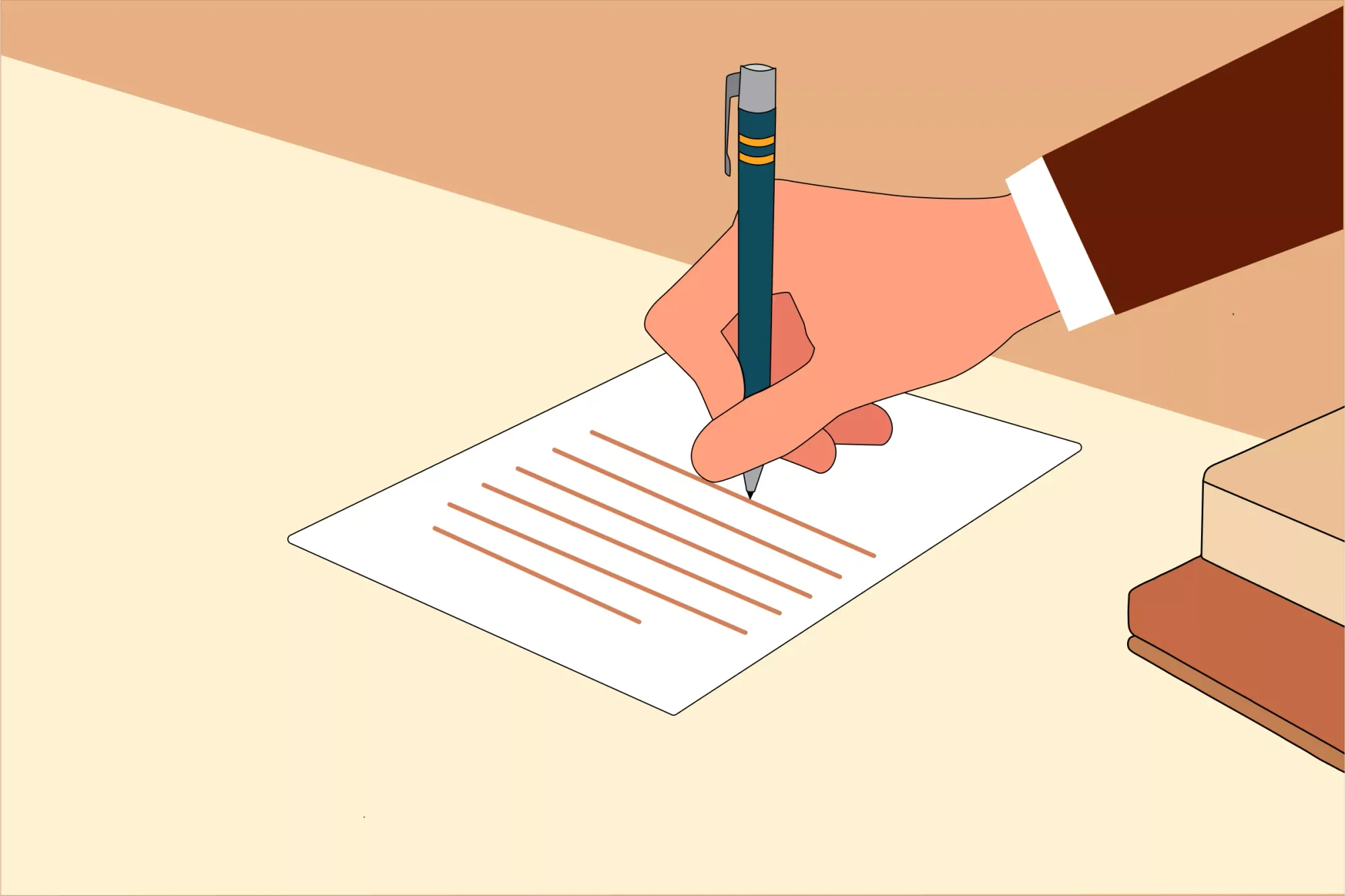A holographic will is handwritten and has no witness signatures or notary provisions. This type of will can present unique challenges. Only certain states consider it to be a valid will when it meets their requirements.
In light of the unique state requirements and potential risks in creating a holographic will, you should consider talking to an attorney about your other options, including a traditional will or a trust.

Key takeaways
- A holographic will is handwritten and usually doesn’t have witnesses or notarization.
- Not all states accept handwritten wills; check your state’s laws before writing one.
- A handwritten note might count as a will, but only if it clearly shows intent and follows state rules.
- These wills are often used in emergencies, like during military service or serious illness.
- Because they aren’t witnessed, holographic wills can be easier to challenge in court.
- Holographic wills aren’t the same as oral wills (spoken or nuncupative wills), which are rarely legal.
- If there’s a conflict between a handwritten will and a formal one, courts usually follow the most recent valid will.
- Typed, notarized wills or trusts are often a safer and more reliable option.
- LegalZoom can help you create personalized estate planning documents that meet your state’s requirements.
What is a holographic will?
As per the Uniform Probate Code (Unif. Prob. Code § 2-502[b]), holographic wills are handwritten wills that have not been witnessed or notarized. Because holographic wills have not been signed in the presence of a witness or notary, they tend to create some problems during the probate process.
These wills are called “holographic” because the term comes from the Greek word "holographos," meaning “written entirely by the same hand,” which aligns with the requirement that the testator (the person who creates the will) must fully handwrite the will.
If a handwritten will meets all the legal requirements for a typed will (such as being witnessed or notarized), then, depending on state law, it typically fulfills the requirements of a valid will and is not considered a holographic will.
How does a holographic will work?
A holographic will does not need to be typed, formally formatted, or witnessed; its validity depends primarily on whether the writing and signature can be verified as those of the testator. For instance, courts may examine handwriting samples to confirm authenticity during probate.
The key point to note here is that a will is considered holographic only if it is entirely written by the testator, with no input from others. This sets it apart from typed or oral wills, which may involve help from attorneys or witnesses.
Though simpler to create, holographic wills are more vulnerable to challenges in court, especially if the testator’s intent is unclear or if questions arise about undue influence or mental capacity.

What are the myths around handwritten wills?
Handwritten wills, also known as holographic wills, are often misunderstood. While they may seem straightforward to create, confusion around their legal status can lead to costly probate delays or disputes. Let’s clear up some of the most common myths.
Myth 1: A handwritten will is valid everywhere
Not all states recognize holographic wills. States like California, Texas, and Arizona accept holographic wills, while others may reject them unless they meet stricter standards. We will look at the state-wise list of acceptance in detail below.
Myth 2: A handwritten will never need witnesses or notarization
In many cases, holographic wills do not require witnesses or notarization to be legally valid, but that doesn’t mean they should be created without them. Some states may still prefer additional evidence of authenticity. Including witness signatures or notarizing the document, even if not required, can help reduce the risk of disputes during estate planning.
Myth 3: A handwritten will always override other documents
If a handwritten document contradicts a previously signed, formal will, the court will typically determine validity based on state law and intent. In states that accept formally executed wills, a holographic version may not override other legally binding estate documents unless clearly stated and lawfully executed.
Myth 4: You don’t need a lawyer for a holographic will
While estate planning with a handwritten will may seem like a DIY option, it often creates ambiguity that courts must resolve. Having an estate planning professional review a handwritten will, if your state allows it, can help ensure that your final wishes are honored without unnecessary legal hurdles.

Comparison: Holographic vs. other wills
Let’s look at how this holographic will is different from other types of wills.
What is the difference between a simple will and a holographic will?
A simple will is typically typed, witnessed, and may be notarized, which makes it easier to validate during probate. A holographic will, as we already know, is a handwritten will that is often unwitnessed and can be harder to authenticate.
What is a non-holographic will?
A non-holographic will is any will that is either typed or written by someone other than the testator, and is usually witnessed and/or notarized to ensure its validity.
What is a self-proving will?
A self-proving will is a type of will that includes a signed statement from the witnesses, usually notarized, confirming that the will was properly signed and created. This helps the court accept the will without needing the witnesses to appear during probate.
How does a holographic will differ from a nuncupative will?
Unlike a holographic will, which must be handwritten and signed by the testator to be valid, a nuncupative will is a spoken, or oral, will. It’s not written down and is usually only allowed in very limited emergency situations.
Comparison chart: Requirements and validity of holographic vs. other wills
| Type of will | Handwritten | Witnesses required | Notarization required | Valid in All States? |
| Holographic will | Yes | No | No | No |
| Simple will | Typically typed | Yes | Often recommended | Yes |
| Nuncupative will (oral) | No | Yes (typically 2+) | Not valid in most states | No |

When would someone write a holographic will?
The most common time for someone to make a holographic will is when they are in imminent danger of death, have not already made a will, or wish to change a will, and writing a formal will isn’t feasible.
Typical examples of such situations would include:
- A member of the armed forces on the battlefield.
- Someone lost in the wilderness who doesn’t expect to survive.
Can a holographic will be revoked?
Yes, a holographic will can be revoked, but only by the testator, the person who wrote it. There are a few ways to revoke a will: You can write a new will that clearly says it replaces the old one, physically destroy the original document, or create a codicil that changes or cancels parts of the existing will.
It is important to be clear about your intent to revoke the will, so there is no confusion after your death. If you are unsure how to make changes, it is a good idea to speak with an attorney to avoid mistakes that could make the will invalid.

What are the legal requirements for a holographic will?
Although we have already come across the legal requirements in bits and pieces, let's look at a consolidated list here. In many states, in order for a holographic will to be valid, it must:
- Be written wholly in the testator’s (the person making the will) handwriting, or the material portions must be in the testator’s handwriting (depending upon the state).
- Indicate the testator’s intent to make a will (as opposed to, for instance, just some notes being used in anticipation of drafting a will).
- Clearly describe the property and assets to be distributed, and identify the beneficiaries for each.
- Demonstrate mental capacity and a sound mind to create a will. The testator needs to show an understanding of what the document means and its effects.
- Be signed by the testator (some states also require that the will be dated).

Are holographic wills legal where you live?
Handwritten wills are not legal across all states. It depends on the state you live in. In 2026, fewer than 30 U.S. states allow them. Even then, each has its own set of rules.
States that recognize holographic wills typically require that the will be entirely handwritten, dated, and signed. Some also ask for clear proof that the testator had the mental capacity to create the document. However, not all handwritten wills are legal; if they don’t meet a state’s requirements, they may be rejected during probate.
A common misconception is that a handwritten note can’t be a will. In some cases, it can, if written entirely by the testator, and it complies with applicable laws and clearly demonstrates testamentary intent. A testamentary intent is the clear intention of a person to create a will and have it take effect after their death.
But in other states, a handwritten will is not legal unless it’s witnessed or notarized, for example:
- Maine. Maine Probate Code Title 18 C §2-502 allows a holographic will even if someone else writes it for the testator.
- Texas. Texas Estates Code § 251.052, on the other hand, requires the entire will to be handwritten by the testator to be valid.
- Some states, like Florida, do not accept holographic wills unless they meet all formal execution requirements.
If you're wondering, "Can a handwritten note be a will?" the safest answer is:
Only if your state laws permit it and only if it meets specific conditions. For example, California accepts holographic wills if they are entirely handwritten, dated, and show clear intent. But in Florida, a handwritten will is not valid unless it is signed and witnessed according to state law. Always check your state’s specific requirements before relying on a handwritten document.

How to write a holographic will | Step-by-step guide
A will is a crucial part of your estate plan, and you want to get it right. Creating a valid holographic will is similar to writing any other will, except that it needs to be in your own handwriting. The process consists of the following steps.
1. Include your identity and intent
Your holographic will must include your full legal name. If you created a will under a different name, such as your maiden name, include that name too. The will must also mention intent, the reason why you are creating the will.
An example would be: “I (full name), also known as (maiden name), residing at (complete address), am creating this will to ensure my property and valuables are distributed according to my wishes upon my death.”
Write legibly, and if you have created a will before, you should mention that this holographic will supersedes any previous will.
Tip: Keep the holographic simple but specific. Include phrases that clearly express your final wishes and who should receive what.
2. Identify assets
Make a list of all assets you possess and wish to distribute. Assets can include bank accounts, real estate, retirement savings, digital assets (cryptocurrency), intangible property such as stocks and bonds, collectibles, jewelry, and even business ownership.
3. List beneficiaries
Appointing beneficiaries for each asset makes estate settlement smoother as you avoid conflict and confusion between loved ones. While you can name anyone as a beneficiary, the following tips will ensure your final wishes are carried out as planned:
- Use the full legal name of each beneficiary
- Name primary and contingent beneficiaries (if possible)
- Appoint a guardian for minor children
- List down detailed instructions about the distribution
4. Choose an executor
An executor of an estate is legally responsible for managing your estate and carrying out the instructions in your will. It’s an important role, and you want to choose someone who not only has the skills to manage this job but also someone you trust and are comfortable with. If you don’t mention an executor, the probate court will assign an estate administrator.
5. Sign and date the will
Before signing, ensure the entire document is legible so others can read and understand it. Then, proceed to sign and date the written document, as this is one of the main validity requirements of a holographic will.
While writing your own will may seem like a faster and cost-saving option, remember that not all states accept handwritten wills, and they can be easily disputed. Although LegalZoom does not create holographic wills, we can help you make a legally valid last will and testament that reflects your true wishes while also protecting your legacy and family.

How to prove a holographic will is valid in court
Holographic wills can very easily be challenged in court because there are no witnesses. To confirm the validity of a holographic will, many states require the following proof.
1. Provide witnesses and testimony
Many states require proof of the will’s validity. This may involve family members being called to testify that they saw the testator write and sign the will or identify the handwriting as that of the testator.
For example, in North Carolina, specific testimony is required to establish that a holographic will was: “Found after the testator’s death among the testator's valuable papers or effects, or in a safe-deposit box or other safe place where it was deposited by the testator or under the testator's authority, or in the possession or custody of some person with whom, or some firm or corporation with which, it was deposited by the testator or under the testator's authority for safekeeping.”
2. Show handwriting evidence
The courts may need to verify the handwriting and the testator's signature. This can be done with the help of handwriting experts or people familiar with the decedent's handwriting. Problems arise when the handwriting is vague or illegible.
3. Demonstrate a sound mind
A key criterion for validity is the presence of mind and mental capacity. To do this, you could record the testator reading the will to confirm their mental soundness. You can also have family members testify to the testator’s capacity at the time they signed the will.

Can you contest a holographic will?
As with any will, a holographic will could be contested for a number of reasons, such as a lack of testamentary capacity to make a will or that it’s been executed incorrectly.
The steps required to contest a will are:
- Consult a probate attorney. Any legal battle is challenging, and probate is a complex issue. Consult an attorney to see if you really have grounds to contest a will.
- Understand state statutes. Each state has rules around what are valid reasons to contest a will and the time period for filing a complaint, also known as “statutes of limitations.”
- Gather evidence. If you are challenging a legal document, the burden of proof falls on you. You need to ensure you have sufficient proof to support your claim. Evidence could be handwriting samples, medical records, or witness statements.
- File a petition. You need to file a petition informing the probate court that you’re challenging the will.
- Negotiate and settle. You can work with the other party outside the court to find a middle ground.
- Go to court. If no agreement can be reached, they'll have to present their case before a probate judge, who will make the final decision. This is expensive and time-consuming.
What are the handwritten will alternatives?
If you’re unsure about writing a holographic will, or live in a state where handwritten wills aren’t accepted, there are other estate planning options that might offer more legal protection and peace of mind.
- One option is a simple typed will, which is generally easier to validate in probate court. Most states require typed wills to be signed and witnessed, but they’re more widely accepted than handwritten ones.
- A self-proving will is another alternative. It includes an attached affidavit, signed and notarized by witnesses, that helps verify the will without needing courtroom testimony.
- If you want more flexibility or privacy, a revocable living trust lets you manage your assets while you’re alive and transfer them to your beneficiaries after death, without going through probate.
- You can also make small updates to an existing will with a codicil.
Online platforms like LegalZoom allow you to create valid wills that meet your state’s requirements, making the process more convenient and secure than relying on a handwritten document.
Glossary and spelling variants for holographic will
It’s easy to get confused by similar-looking terms or common spelling errors when researching handwritten wills. Here’s a quick guide to help clarify what’s what.
- Holographic will: The correct legal term. Holigraphic will, holigraph, halographic will, holgraphic, holografic, holograpic, hallographic, holo graphic—all of these are misspellings of “holographic will.”
- Holographic signature: Sometimes used to describe a handwritten signature, but not interchangeable with “holographic will.”
- Holographic codicil: A handwritten amendment to a will. Like a holographic will, it must meet state requirements.
- Codicil: A legal document used to make changes to an existing will. If the original will is a holographic will, the codicil can also be handwritten by the testator. It must follow the same rules, like being clearly written, signed, and showing intent to update the will.
Holographic will examples and templates
Seeing examples of how to write a handwritten will can be helpful, especially if your state recognizes holographic wills. Below are a few sample formats to guide you. These are provided for general reference and should not be considered official templates.
Holographic will: Example 1
I, Olivia Marks, of San Diego, California, am of sound mind and declare this to be my last will and testament. I leave my home and personal belongings to my daughter, Emily Marks. I leave my savings account to my son, Daniel Marks. This will replace any previous wills.
Signed: Olivia Marks
Date: March 1, 2025
Holographic will: Example 2
This is my handwritten will. I, Ruth Simmons, leave all my household belongings to my niece, Clara Simmons, and my retirement savings to my son, Michael.
Signed: Ruth Simmons
Date: Jan. 20, 2025
These are just a few examples of handwritten wills.

How can LegalZoom help you
Writing a will, whether it's a formal document or a will created by hand, takes careful consideration. But you don’t have to navigate it alone.
LegalZoom makes it easy to create your estate planning documents from the comfort of home, using a guided, step-by-step platform built by experienced attorneys and accepted in all 50 states. Whether you need a new will, a financial power of attorney, or a healthcare directive, you’ll find the support and tools to help protect what matters most.
If you're unsure about relying on holographic wills made in limited circumstances or if your state doesn't accept handwritten wills at all, LegalZoom offers convenient, personalized options for creating professionally drafted wills. You’ll answer simple questions, and we’ll help you build documents that reflect your wishes. You also have the option to have your documents reviewed by a licensed attorney and allow for unlimited updates as your life changes.
Need help choosing subscribing witnesses or understanding what makes a document legally valid? Our platform guides you through each step with clarity and confidence, supporting your unique estate planning needs every step of the way.
Join the 1.4 million people who have securely made their final wills online and have peace of mind with us. Here is the feedback left by our consumers, who have left hundreds of 5-star evaluations on TrustPilot:
LegalZoom made this easy to understand, and they were helpful and fast about it.
- Jerry M., last will & testament customer
FAQs
What are the most common types of wills?
The most common types of wills are joint wills, simple wills, and testamentary trust wills. Each kind of will has a different purpose. For example, a testamentary trust will is commonly used when the testator’s beneficiaries are minors.
Do holographic wills need witnesses?
By definition, holographic wills don’t need a witness. However, some states, like Delaware, will only recognize holographic wills if there is a witness.
What are the disadvantages of a holographic will?
The biggest drawback of holographic wills is their legal validity. The informal nature (lack of witnesses and notarization) of such wills makes them easy to challenge. Because most individuals use a holographic will without the presence of a lawyer, they might not understand the full complexity of estate law and can make drafting errors.
Why would a holographic will be disallowed?
A holographic will can be disallowed if it doesn’t meet your state’s legal requirements, like being fully handwritten, clearly showing intent, or signed by the testator. It may also be rejected if the handwriting is unclear, the instructions are vague, or someone challenges the testator’s mental capacity.
Why do many states recognize a holographic will even without witnesses?
Many states accept holographic wills without witnesses because the handwritten document itself, when signed and clearly expressing intent, can serve as strong evidence of the testator’s wishes. Courts may rely on handwriting analysis or testimony from those familiar with the testator to confirm validity.
Do courts accept handwritten wills?
Yes, but only in states where handwritten or holographic wills are legally recognized. Even then, courts will review the document closely to ensure it meets all state-specific requirements, such as intent, clarity, and the testator’s signature.
Should I create a holographic will?
A holographic will may be better than having no will at all, especially in urgent situations. However, because they’re easier to challenge in court, they’re not ideal for long-term planning. If possible, it’s safer to create a formal will with legal guidance.
Are handwritten wills legal in California?
Yes. A California handwritten will is considered valid if it is entirely written and signed by the testator.
What are the holographic will requirements in California?
Here are the California holographic will requirements:
- The will is dated and legibly written in the testator’s own handwriting
- The will must show clear intent and include important terms like beneficiaries and asset distribution
Witnesses are not required in this will.
What does a holographic will template in California look like?
While no official state template exists, many estate planning resources provide sample formats you can follow. In California, a holographic will must be handwritten, signed, and clearly show your intent to distribute your property after death. A basic outline usually includes:
- Your full legal name and address
- A clear statement that this is your last will and testament
- A list of your assets and who you want to leave them to (beneficiaries)
- The name of the person you want to serve as executor
- Your handwritten signature and the date
Even though it doesn’t need to be witnessed, writing your will clearly and including specific details can help reduce confusion later.
Is a handwritten will legal in Texas?
Yes. A holographic will in Texas is valid if entirely written by hand and signed by the testator. No witnesses or notary is required for it to be legally binding.
Swara Ahluwalia, contributed to this article.



